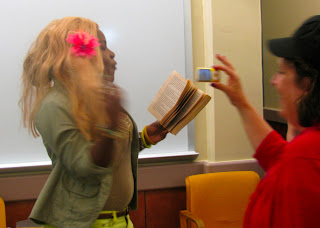1. Do your research.
Read the information at:
http://serendip.brynmawr.edu/biology/b103/f01/web2/wise.html
And listen to the short lecture at:
http://www.youtube.com/watch?v=l2QtSbP4FRg
You can also find more information if you do some research on Gardner's Multiple Intelligence Theory.
And here is another EXCELLENT website to read, which really explains a lot:
http://www.thirteen.org/edonline/concept2class/mi/index_sub1.html
2.
Think about your own intelligences. You are probably intelligent in
many of the ways described in Gardner’s theory but choose one or two of
your best areas. You can take the multiple intelligence quiz that I've given you as a handout or go to
(http://www.rappispellread.com/MItest.pdf) to help you learn more about
your intelligences.
3. For your presentation:
First,
explain to the class how you are intelligent in that way and give us
some examples. For instance, “I believe that I’m musically intelligent. I
can hear a song on the radio and then play it on the piano. I’ve been
doing this since I was 5 years old. Also, when I hear a symphony, I can
distinguish the sounds of the different instruments, etc., etc.”
Second,
explain how that intelligence could be applied to learning a subject,
or a SPECIFIC lesson. The subject does not have to be English or
language. It could be physics or economics or whatever you would like.
So, for example, if you are musically intelligent, learning infinitives
or calculus equations in a song might be a good way for you to learn
that lesson. I want you to TEACH us your lesson!
Today
in class I gave you an example of how I could teach a grammar lesson
(adjective clauses) in different ways. I used linguistic, mathematical,
and musical ways to teach the grammar. I also could have used
interpersonal intelligence (maybe by writing a skit, or acting out a
scene).
Here are some other thoughts from the website cited above:
"You
may come to regard intellectual ability more broadly. Drawing a
picture, composing, or listening to music, watching a performance --
these activities can be a vital door to learning -- as important as
writing and mathematics. Studies show that many students who perform
poorly on traditional tests are turned on to learning when classroom
experiences incorporate artistic, athletic, and musical activities.
Take music, for example. As educator, David Thornburg of the Thornburg Institute notes,
"The
mood of a piece of music might communicate, clearer than words, the
feeling of an era being studied in history. The exploration of rhythm
can help some students understand fractions. The exploration of the
sounds of an organ can lead to an understanding of vibrational modes in
physics. What caused the great scientist Kepler to think of the motions
of planets in musical terms? Astronomy students could program a
synthesizer to play Kepler's 'music of the spheres' and explore history,
science, math and music all at once."
I know this
isn't so easy but I want you to think hard and to be creative in your
ideas and teach all of us something new! You should speak for 7-10
minutes.
A good presentation will have an interesting and engaging introduction, a well-organized body, and a definite conclusion (do not end your presentation with "that's all!.")
Before your present in front of the class, I want you to present in front of at least two people (who could be your classmates) to get feedback. The feedback form is below. Please have them fill out the form and turn it in to me. Your classmates will fill out similar feedback forms when they watch you present in class.
https://docs.google.com/file/d/0B-rIza1967iVeWZnQmlpQnQwd3M/edit?usp=sharing
Presentation Schedule:
5A
Monday: Dennis, Karina
Tuesday: Suliman, Essa
Wednesday: Ahmed, Abdulrahman, Rita, Xiao
Thursday: Igor, Hang, Jinda,Vicky
Friday: Jennifer, Maeva, Francisco, Serena, Talal
5B
Monday:
Tuesday: Fatimah, Ibrahim, Moath, Jean
Wednesday: Sam, Suzan, Monny, Phuong
Thursday: Merry, America, Hamzah, Zhao
Friday: Tim, Sara, Kexin, Maryam































